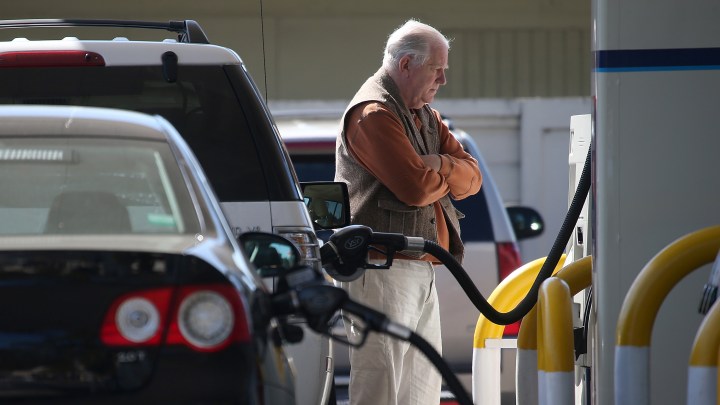
Will oil price spike lead to higher prices at the pump?

Could a drone strike on oil reserves in Saudi Arabia eventually hit gasoline consumers in the U.S.?
The price of Brent crude — the international oil benchmark — spiked as much as 20% on Monday to above $71 per barrel. That’s the highest price in nearly four months. It comes after a drone strike on a vital crude processing plant in Saudi Arabia wiped out more than 5% of global supplies.
In an effort to calm markets on Monday, Mohammad Barkindo, the secretary general of the Organization of the Petroleum Exporting Countries, or OPEC, told Bloomberg there is no need for panic and that the priority now is to ensure markets continue to be well supplied. He said Saudi Arabia, the world’s second-biggest oil producer, has “ample supplies in inventories they are going to tap into” and that he believed the situation has so far been contained, though security has now become a bigger issue for all oil-producing nations.
On the global edition of “Marketplace Morning Report,” the BBC’s Victoria Craig talked with Harry Tchilinguirian, head of commodities strategy at BNP Paribas, about whether the hit to Saudi Arabia’s oil supply will have a longer-term impact on global crude prices.
Below is an edited transcript of their conversation.
Victoria Craig: Oil prices are spiking today in reaction to this weekend’s attack. Will this be a reaction that will impact the oil market for longer than just a couple of days?
Harry Tchilinguirian: The key issue really is to estimate the amount of damage that has been made to Abqaiq, which is the processing facility that was attacked. Now, depending on whether or not the damage is severe, the prices that we’re currently seeing in the market may or may not be sustained. So to that effect, we are waiting for a status report from Saudi Aramco. On Sunday, they indicated that they would provide one within 48 hours, and that is still pending. However, Saudi Arabia has a lot of oil stocks and will continue to use them in order to meet its commitments to its customers.
Craig: So what happens now with supply? Can OPEC producers who, for the last several years have curbed output to battle high prices, can they restart production to fill the gap that we now see from Saudi Arabia?
Tchilinguirian: I think it’s a little bit premature to talk about other oil producers stepping in to fill the gap. And also at the same time, I think it’s looking at a situation in terms of spare production capacity. The spare production capacity has always been concentrated in Saudi Arabia. So in effect, how much other countries could step up production — should they choose to do so in a coordinated OPEC movement — remains to be seen.
Craig: And President Trump last night tweeted he’s authorized supplies from America’s Strategic Petroleum Reserve to be released, if necessary. What is this reserve of supply? And are there other such reserves that can be deployed in other parts of the world if necessary?
Tchilinguirian: Yes, absolutely. So, the International Energy Agency, which represents consuming countries of which the U.S. is a member, hold strategic stocks. So every country has an obligation to hold a certain amount of oil in the event of supply contingencies, in particular supply disruptions. So what happens is that if a supply disruption is identified, under the definitions of the International Energy Agency, then they can release stock. So, who are the member countries of the International Energy Agency? They’re typically OECD countries, and overall government controlled stocks by OECD countries come to about 1.2 billion barrels of crude oil. So there is a lot of oil held in government-controlled storage that could be released onto the market should Saudi prove to take more time in reinstating its production. The last time there was a coordinated stock release by IEA governments, that was back in 2011 when Libya oil production was halted as a result of the country suddenly going into war.
Craig: The U.S. blamed Iran for orchestrating the weekend attack. Iran’s foreign minister accused the U.S. of deceit and the country today said it’s ready to cooperate with the UN seeking peace in the region. At the same time, Yemen’s Houthi movement, said the Aramco processing plants are still a major target and could be attacked at any moment. How high is the risk of further escalation?
Tchilinguirian: It remains to be seen whether the Houthi-backed rebels that are currently identified as the perpetrators of these attacks have the means to organize an attack of the nature we saw on Saturday. If indeed they’re backed by Iran, that is a possibility.
Craig: Crude oil prices have spiked this morning in reaction to all of this. Is there a point at which this could potentially hit consumers at the gas pump?
Tchilinguirian: In as much as a higher crude price will eventually translate into a higher gasoline price, which is important for U.S. consumers, the current level of oil prices is yet to be so high that it could be damaging for the economy.
There’s a lot happening in the world. Through it all, Marketplace is here for you.
You rely on Marketplace to break down the world’s events and tell you how it affects you in a fact-based, approachable way. We rely on your financial support to keep making that possible.
Your donation today powers the independent journalism that you rely on. For just $5/month, you can help sustain Marketplace so we can keep reporting on the things that matter to you.












